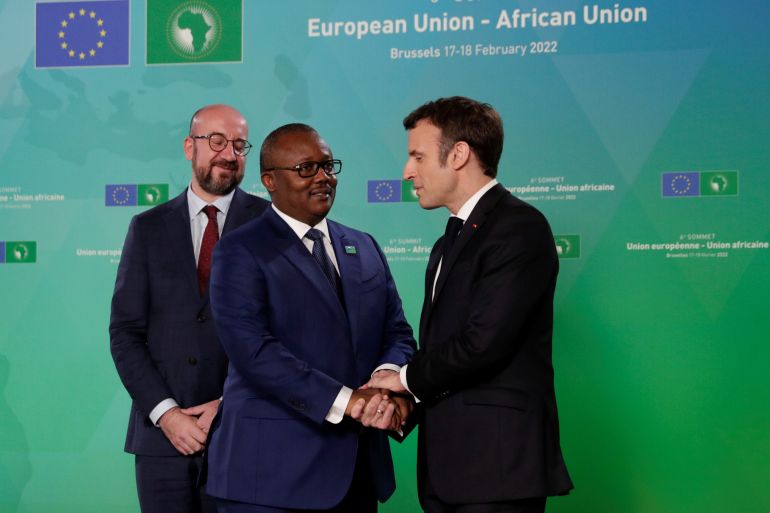West Africa bloc chair says Guinea accepts two-year transition
In July, bloc leaders met in Accra, Ghana to discuss transitions to civilian rule in Guinea, Mali and Burkina Faso.

The chair of the West African regional bloc has said Guinea will cut the timeline of its planned transition to civilian rule from three to two years.
Speaking alongside French President Emmanuel Macron at a media briefing in Bissau, Guinea-Bissau President Umaro Sissoco Embalo, who is chair of the Economic Community of West African States (ECOWAS), said he had recently convinced Guinea’s military government to shorten its timeline.
Keep reading
list of 4 itemsTen crew killed after two Malaysian Navy helicopters collide in midair
Russia-Ukraine war: List of key events, day 789
Mass graves found at Gaza hospital raided by Israeli army
“I was in Conakry with the president of the commission (of ECOWAS) to make the military junta understand the decision of the summit of heads of state that the transition cannot exceed 24 months”, Embalo said.
“They had proposed 36 months, but we succeeded in convincing them,” he added.
Ousmane Gaoual Diallo, a Guinean minister and spokesman for the transitional government, told AFP that “neither the government nor the presidency confirm this information about the duration of the transition in Guinea”.
An ECOWAS official told AFP on condition of anonymity: “The principle is accepted but we were waiting to formalise it … before announcing it.”
Last September, soldiers led by Colonel Mamady Doumbouya overthrew President Alpha Conde and in May, the military pledged to hand over power to elected civilians within three years.
But regional powers rejected this timeline, with ECOWAS suspending Guinea after the coup.
Last week, West African mediators met Guinea’s ruling military government for talks on a return to civilian rule, according to ECOWAS and state media. Embalo, Gambian diplomat Omar Alieu Touray, who is the president of the ECOWAS commission, and Benin’s former president Thomas Boni Yayi, the ECOWAS mediator for Guinea, were all present.
Earlier in July, ECOWAS leaders had met in Ghana’s capital Accra to discuss transitions to civilian rule in Guinea, as well as Mali and Burkina Faso, which together have undergone four coups since August 2020.
They lifted tough sanctions that had been imposed on Mali’s military regime, accepting a March 2024 return to civilian rule.
And they agreed to allow Burkina Faso two years for its transition back to democracy.
But discussions until then had been trickier with the rulers of Guinea, where the government had announced a 36-month transition – a period that African Union chairman and Senegalese President Macky Sall described as “unthinkable”.
On Thursday, protests against Guinea’s military leaders brought Conakry to a standstill.
The National Front for the Defence of the Constitution (FNDC), a coalition of political parties, trade unions and civil society organisations, called the demonstrations to denounce the government’s “unilateral management” of any return to civilian rule.
Other parties and coalitions joined the protests.
In May, the government banned public demonstrations, and Thursday’s protests led to sporadic clashes between demonstrators and police.